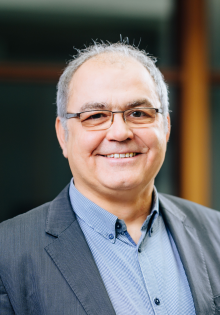In 2018, the German Research Foundation (DFG) established a large-scale Priority Programme co-ordinated by Paderborn University and entitled ‘Electronic-Photonic Integrated Systems for Ultrafast Signal Processing’. The goals of the Priority Programme are to research electronic-photonic circuits and develop corresponding algorithms, and thereby to shift the focus of research from integrated photonics and device physics to a circuit and system perspective. The programme has now entered its second phase, following the DFG’s announcement of a three-year extension, and will now run until 2024. The Priority Programme, led by Professor Christoph Scheytt from Paderborn University’s Heinz Nixdorf Institute, has a total budget of around €12 million and will run for a total of six years.
“Optical or electronic signal processing and nanophotonic integration technology offer numerous benefits. Photons, which form the basis for optical technologies, are small particles of light that make up electromagnetic radiation. In the Priority Programme, 17 research groups from all over Germany are investigating new systems based on silicon photonics – a key technology of the 21st century,” explains Scheytt. Silicon photonics enables the combination of nanophotonic circuits such as optical waveguides filters or switches with integrated electronic circuits such as processors. The combination of complex electronics and miniaturised photonics on one chip enables completely new methods of signal processing and communication. The technology also offers benefits in terms of sustainability: Integrated electronic-photonic circuits are smaller and more energy-efficient. The use of ever smaller components therefore equals cost and resource savings.
“Purely electronic signal processing works on the basis of transistors. In the past, it was possible to continuously increase the speed and performance of these, but, for physical reasons, this is no longer possible. The speed of microchips has reached its limits,” explains Scheytt. According to the scientist, optical signal processing enables much higher signal speeds, which, in turn, mean higher radio frequencies and data rates, for example. The main goal of the Priority Programme is therefore to research new circuits, systems and algorithms for electronic-photonic signal processing. Scheytt says: “By developing highly integrated chips in advanced semiconductor technologies, we also want to demonstrate that far faster and more energy-efficient systems are achievable.”In the future, significantly higher performance coupled with lower energy consumption could minimise the impact of information and communications technology on the environment and climate. Scheytt: “In addition, the circuits also pave the way for hardware solutions for completely new applications, e.g. in medical technology or for autonomous vehicles or the Internet of Things.”


